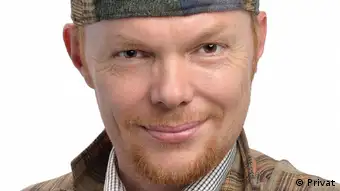Interview
Research project reveals most underreported news stories
Some topics and world regions get much more coverage than others. Communication scientist Hektor Haarkötter offers insights into the reasons why.

One of the underreported news in 2024: The continued use of Pegasus spyware to target politicians, journalists, and activists around the world
For more than 25 years, one organization has drawn the public's attention to topics and news that have been neglected by the German mass media. The Initiative Nachrichtenaufklärung (INA, German for "Initiative News Enlightenment") is a media-critical non-governmental organization. Once a year, the INA presents the top ten neglected news stories in Germany. This year, the list includes environmental protection issues and how big tech jeopardizes democracy.
In June 2023, the INA, together with the US-based Project Censored, published an international list of the top five forgotten news for the first time. It was compiled by a 27-member international jury and presented at Deutsche Welle's Global Media Forum in Bonn. The top three are about the continued use of Pegasus spyware to target politicians, journalists, and activists; the killings of environmental activists; and the growth of artificial intelligence and its impact on people and ecosystems.
DW Akademie spoke to Hektor Haarkötter, head of the INA, to find out more about which stories get neglected and why more complexity and nuance is needed in the media.
DW Akademie: Mr. Haarkötter, have the neglected topics in Germany changed over the years or are there recurring trends?
Hektor Haarkötter: There are indeed major constants, and that's because the reasons for neglecting the news haven't changed. Certain topics have a particularly hard time in the media's perception, for example the social sector. Another area in which we have received submissions every year, that is since I joined the initiative over 15 years ago, is closed institutions of all kinds: Prisons, care facilities, retirement homes, psychiatric wards and so on. Clearly, these are stories that take place behind closed doors. And it is simply incredibly complicated, difficult, and time-consuming for journalists to do any research at all. And with working hours being compressed and the lack of resources in newsrooms, you can imagine that editorial teams tend to shy away from these stories in favor of stories that are much easier to research.
In June last year, for the first time you presented an international edition of neglected topics, together with your US-American partner Project Censored. Why is the international perspective important?
The news markets have become very globalized and unified, especially due to the internet and large platform providers and because we are all on the same platforms globally. This has long drawn our attention to the fact that we need to focus much more on algorithmic news selection. These algorithms have a bias, an imbalance built into them, which also means that certain relevant topics no longer reach people. And of course, there is another bias, which we have also highlighted in our new book publication, the anthology "Agenda Cutting": There are entire world regions that are neglected or even completely ignored in the media, at least in the Western industrialized nations. And you can only point this out if you take a global perspective on the news market.
Which parts of the world are most neglected by the media?
We have a bias in Germany because we have a strong focus on English-speaking countries, especially in Africa. Francophone countries are practically not captured in our media coverage. The bottom line — we have two empirical analyses on this — is that Africa is almost completely cut out from a German media perspective. In the end, it boils down to the fact that the southern hemisphere, the Global South, is widely neglected in the media coverage of Western industrialized nations. If you then think about how many people live there, namely the majority of the world's population, then this void is almost grotesque.
You also found that people are actively avoiding the news. Why is that?
People have turned their backs on the news that could still reach them via, let's say, mainstream media. They no longer seem to be interested in it. They are oversaturated. There are various reasons for this. One important reason, as our US-American partners at Censored keep pointing out, is something they call junk food news, this kind of easily digestible news that is extremely widespread online because it has a lot of clicks: tabloid stories about celebrities and sportspeople. It's all very fluffy and easy to read on a mobile phone, on the underground or on the train, without much mental effort. And that comes at the expense of the time spent on news that perhaps has a little more socio-political impact.
Our media consumption today is increasingly image-focused, a shift sometimes referred to as the 'visual turn.' Does that play a role in news avoidance?
I believe that one reason for news avoidance is precisely this visual turn. People today think they need to find out about the world on TikTok and Instagram. However, this is only fragmented and fragmentary information about the world, which is certainly not sufficient for forming a socio-political opinion. Some of my students have problems grasping texts of a certain length and level of complexity at a relatively fast pace. So, I think there's a lot to be done here in terms of media education or education in general. We actually need analogue classrooms again, because analogue skills are disappearing and can't be replaced by digital skills. What do I gain from being able to use an iPad? But what if I have great difficulty reading a novella? Then we really do have a socio-political problem, and we are experiencing this right now, which can be empirically proven by the decreasing viewing figures of news programs, the decline in newspaper circulation or even the developments on the book market.

Hektor Haarkötter, professor for communication science, investigates the topic of agenda cutting in the media
How can we counteract junk news and make sure people are properly informed?
Our initiative has the word enlightenment in its name for good reason. Enlightenment in the sense of learning to think critically, including the ability to assess the validity and value of a source. In the end, the reader has to decide whether they fall for a story or whether they question it. This is not just about the credibility of the media, which may play a role here. But if we have to believe the media, something is wrong. We ourselves need the ability to assess credibility and to be able to judge the truth or falsity of news. As Immanuel Kant concluded in his famous essay 'What is enlightenment?', dare to use your own mind. And I believe we also need a new kind of media education that follows precisely this guiding principle. In the end, it is up to the individual to decide which messages to follow, to be able to judge whether someone is making a legitimate election campaign for their political goals or whether they are just invoking populist language to try and get their share of the cake of political power.
The list of neglected news also includes issues relating to the restriction of freedom of the press and freedom of expression for journalists and activists, for example the continued use of the Pegasus spyware. What does this tell us?
The majority of countries in the world are not democracies. According to the Democracy Index, only 24 out of 167 countries can still be described as full democracies. That is of course a disastrous picture. We are not only discussing the decline of democracy or the crisis of democracy in communication studies, but also in political science and in politics itself. Democracy is something you have to actively fight for and maintain. Here in Germany and in other Western European countries, we too have enemies of democracy in our parliaments, sometimes in our governments — think of Italy, of Hungary — and we must not only be aware of this, but we must also actively fight for our democratic rights, including freedom of the press and the right to physical integrity. That is why it is so encouraging that in Germany and now also in Austria and even Switzerland, large numbers of citizens are taking to the streets to fight for democracy.
About the author: Hektor Haarkötter is a professor of communication science with a focus on political communication at the Bonn-Rhein-Sieg University of Applied Sciences in Sankt Augustin, Germany. He is chairman of the INA and has written several books on journalism.
Interview: Alexandra Spaeth
DW recommends
- Date 29.04.2024
- Feedback: Send us your feedback.
- Print Print this page
- Permalink https://p.dw.com/p/4fAvV
- Date 29.04.2024
- Send us your feedback.
- Print Print this page
- Permalink https://p.dw.com/p/4fAvV
